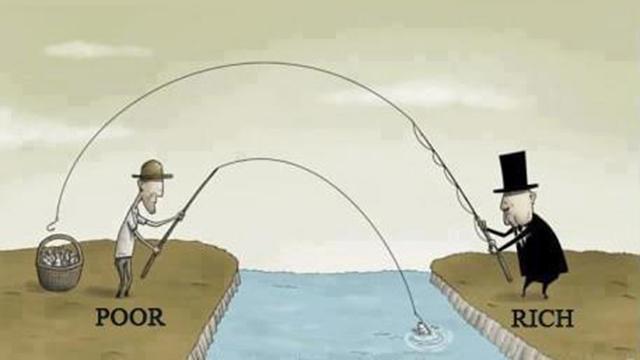Are the Rich more Likely to be
Morally Challenged?
How pathetic for Robert Kraft, rich
enough to pay for whatever sexual services he desires, to be caught
in a shabby massage parlor in a ratty strip mall, not once but twice.
The local paper took advantage of
this embarrassment of one super rich owner of a sports team—and not
just any
sports team-- to list some of the other instances of team owners
falling afoul of the law for fraud, for being addicted to pain pills,
for being blatantly racist. Other owners participated in major
bribery schemes or were overwhelmed by gambling debts. Without quite
saying so, the paper seems to suggest that the very rich team owners
are often tempted to act very badly and often succumb to the
temptations.
Is this just the envy of ordinary
folks speaking? We work hard and toward the end of every month we are
short of cash. So when the rich are embarrassed publicly we can't
help gloating and boasting of our—supposed--moral superiority. You
and I are not tempted to pay huge bribes to politicians or to run up
$25 million gambling debts. So we can feel morally superior when we
do not indulge in such behavior.
But perhaps our suspicions of the
moral weakness of the very rich is not completely unreasonable. Let
us ask: how did they get to be so rich? I am not asking what it is
about Robert Kraft that makes him so much wealthier than I am. I
cannot answer that question because I do not know Kraft. Does he work
harder than I do, is he smarter, is he more interested in wealth than
I am? I have no idea. But the question is not about the character and
personality of the rich. It is about the system controlling our
lives. What does this system require of us to become very rich or
even moderately so?
It seems clear that competition is
at the heart of our system; the winners must be prodigiously good
competitors. The rich are better competitors. But competitions are of
different sorts. Some are completely benign; in others the outcome is
brutally destructive of some participants in the competition while
others walk away with impressive wealth.
In some competitions, the winner
simply worked harder, worked longer hours, was more focused than all
others. The winner trained more frequently. Even at rest his or her
thoughts were wholly taken up with the upcoming competition.
Completely concentrated they win. This is a benign competition that
produces exceptional performances. But it is only one kind of
competition.
In the early days of the personal
computer, anyone could purchase the parts and assemble a machine. I
have done so myself. As a consequence a large number of small
enterprises produced inexpensive but quite adequate table top
computers. Bill Gates participated in this computer business,
competing with many other entrepreneurs to found a profitable
business producing personal computers. According to one biographer,
Gates' style of competition was not benign. He did not try to get
ahead of the pack by being more diligent or inventive. His energy was
focused on putting his competitors out of business. His project was
clearly destructive, to reduce the competition by underselling
machines of other producers and ruining the competing business. This
kind of competition aims clearly at the injury of the competition.
Some athletes in team sports seek to injure members of the opposing
team. Here competition is intentionally destructive.
A third form of competition injures
third parties. Tobacco companies concealed the damages done by
cigarettes. The health of consumers counted for nothing as compared
to the company's bottom line. Similar competitions injuring third
parties occur when companies pollute streams, dump toxic materials,
use fracking techniques and hide their destructive effects.
Enterprises using these destructive
forms of competition do not always end in the winners' circle. The
owners of the Orchids of Asia Day Spa in Jupiter FL where Robert
Kraft is said to have enjoyed sexual services for $79 an hour are not
likely to be billionaires even though they traffic Asian women, keep
them locked up, and force them to do sex work. Here third parties are
grievously injured. The perpetrators nevertheless do not become as
rich as some of their patrons.
Some competitors however succeed to
parlay their destruction of opponents or of third parties into
obscene wealth. Instances of their techniques are everywhere. While
the rich are rapidly getting richer, wages and salaries of common
people have barely rise in the last 50 years. Although prices have
risen steadily, the minimum wage has remained unchanged until
recently. An energetic movement to raise the minimum wage encounters
strenuous resistance from employers; they are determined not to pay a
living wage. They, often champions of family values, also resist paid
maternity and paternity leave. Their main interest is to raise their
profits by keeping wages and salaries as low as possible. They
compete strenuously and do not mind if their competition injures
large groups of their fellow citizens. Nor should we forget how, in
the past, the rich derived their wealth from keeping slaves, or
exploiting black tenant farmers violently during the era of Jim Crow.
Yes, the rich are more likely to be
competing with methods doing serious damage to large numbers of
Americans. Are their moral stamina more fragile than that of most of
their fellow citizens? I doubt it. The basic truth is that our
economic system, placing competition at the center, encourages
enterprising men and women to compete by doing serious damage to many
others. In so doing successfully they not only earn lots of money and
high social status but they do untold damage to citizens who do not
earn a living wage, whose drinking wells are polluted or who are
forced to work as prostitutes. That is the naked face of capitalism.


No comments:
Post a Comment